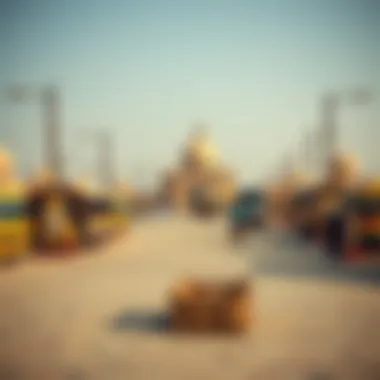Gulf Trade in Dubai: An In-Depth Analysis


Intro
Dubai, often viewed as a shimmering desert metropolis, provides a fertile ground for trade dynamics that have evolved over centuries. With its strategic coastal location along the Gulf, the city functions as a crucial nexus for international commerce, drawing in investors and traders from around the world. The growth of this trade has been pivotal in transforming Dubai's economy from a focus on oil dependency to a more diversified portfolio including real estate, tourism, and finance.
As we dig into the Gulf Trade in Dubai, we find more than just transactions; it's a comprehensive ecosystem that shapes the economic landscape of the emirate. Understanding its historical significance helps elucidate current market trends and helps predict future developments. This exploration will touch on various facets including market analysis, investment opportunities, and how they intertwine with regional politics and global market forces. This information proves invaluable, particularly for homebuyers, investors, and analysts aiming to navigate this potentially lucrative space.
In this article, expect a thorough examination of crucial topics such as:
- The current trends in Dubai real estate and their roots in Gulf Trade.
- Price dynamics and forecasts providing insights into market expectations.
- Identifiable investment opportunities that can yield high returns.
- A look at emerging neighborhoods appealing to expatriates seeking to settle.
By honing in on these elements, the intention is to equip all readers with a well-rounded understanding of the Gulf Trade's role, its challenges, and its prospects within the vibrant tapestry of Dubai’s economy.
Prelims to the Gulf Trade
The Gulf Trade is a cornerstone of Dubai’s dynamic economic landscape. It holds enormous significance not just for the local economy but also for the broader Middle Eastern and global markets. This trade acts as a crucial bridge that fosters the movement of goods, services, and ideas across borders, providing robustness to Dubai's socio-economic infrastructure. For investors, homebuyers, and analysts, understanding the intricacies of this trade helps unpack the myriad opportunities it presents.
With its strategic location, Dubai has historically positioned itself as a major trading hub, drawing in a diverse range of businesses. The trade dynamics have evolved over the years, influenced by regional geopolitics, market demands, and socio-economic shifts. Particularly, the Gulf Cooperation Council (GCC) countries have played an instrumental role in establishing a network of trade agreements that facilitate bilateral transactions.
In light of these developments, several core benefits emerge from analyzing Gulf trade:
- Economic Growth: The influx of trade contributes significantly to the GDP, promoting investment in various sectors such as real estate, tourism, and logistics.
- Cultural Exchange: Trade fosters multi-national business relationships, leading to a vibrant culture of exchange that enriches the society.
- Investment Opportunities: Understanding trade routes and partnerships opens doors for savvy investors, especially in real estate, where demand rises alongside economic vitality.
As we delve deeper into this article, a compelling narrative unfolds about the impact of historical contexts, geographical significance, and the prevailing market conditions that shape the Gulf Trade. Through detailed discussions, we aim to equip readers with a nuanced understanding of how these elements intertwine, ultimately influencing the future landscape of investment in Dubai.
Historical Context
To appreciate the Gulf Trade’s relevance today, one must look back at its historical roots. The area has been a trading post for centuries, characterized by the exchange of goods like spices, pearls, and textiles. Traders from Persia, India, and beyond frequented the shores of what is now Dubai, establishing a tradition that continues to this day. The discovery of oil in the 20th century catapulted the region into the global economic arena, dramatically transforming the scale and nature of trade.
This booming oil economy paved the way for infrastructural developments, enabling the establishment of ports like Jebel Ali, which is now one of the busiest ports in the world. The government’s commitment to diversifying the economy post-oil era is a testament to the evolutionary journey of Gulf trade, establishing alternate sectors that are just as vibrant.
Geographical Significance
The unique geographical position of Dubai serves as an indispensable strategic asset in the realm of Gulf Trade. Nestled between continents, Dubai functions as a vital nexus linking East to West and North to South. This advantageous location not only facilitates ease of access to global markets but also cultivates important trading relationships across regions.
The climate and topography, while arid, contribute to the establishment of modern infrastructure that supports logistics and distribution methodologies in place today. Significant developments in the transport sector, including the expansion of Dubai International Airport and advanced road networks, have solidified the emirate's status as a logistical powerhouse. The UAE’s free zones have further enhanced its appeal by offering tax incentives and regulatory ease, creating an attractive environment for businesses.
The Economic Framework of Dubai
The economic framework of Dubai serves as the backbone of its thriving Gulf Trade. Understanding this framework is essential to grasp how Dubai has transformed itself into a global trading hub. The blend of traditional commerce and modern innovation sets the stage for a dynamic environment where trade flourishes. Through an array of core economic activities and a well-rounded approach to diversification, Dubai cultivates a robust economic landscape. This section explores these aspects in detail.
Core Economic Activities
Dubai's economy isn't a one-trick pony; it's more of a multifaceted jewel. The major economic activities can be categorized into five crucial sectors:
- Trade and Logistics: This is the heartbeat of Dubai's economy, contributing to over 30% of its GDP. Thanks to its strategic location, the city acts as an efficient gateway connecting East and West. Port Jebel Ali, for example, is one of the largest and busiest ports in the region, handling millions of containers every year.
- Tourism: With its towering skyscrapers and luxurious resorts, tourism accounts for nearly 20% of Dubai's GDP. Events like the Dubai Shopping Festival and Expo 2020 draw millions of visitors annually, providing a substantial boost to retail and hospitality.
- Aviation: The aviation industry underpins Dubai’s economic framework. The Dubai International Airport has become one of the busiest airports worldwide, facilitating millions of passengers and tons of cargo each year.
- Real Estate: A crowd-puller in foreign investment, the real estate sector continually attracts buyers looking for high returns. Iconic structures like the Burj Khalifa symbolize the city’s ambition, while the development of freehold areas allows foreigners to invest.
- Finance: Dubai is home to several banks and financial institutions that cater to both local and international customers. The Dubai Financial Market facilitates stock trading, enhancing the financial ecosystem in the city.
Role of Diversification
In an era where economies tied to a single sector face bleak futures, Dubai's intentional focus on diversification acts as its safety net. This strategic approach has three key advantages:
- Economic Resilience: With a diversified economy, Dubai demonstrates resilience against global market fluctuations. If oil prices dip, as they frequently do, other sectors can step in to maintain economic stability.
- Investment Opportunities: The presence of various economic sectors creates a rich tapestry of investment opportunities. From tech startups to luxury real estate, investors can find promising ventures that align with their interests and goals.
- Employment Creation: A broader economic base results in more job opportunities across sectors. As new industries emerge and existing ones evolve, the demand for varied skill sets fosters a competitive labor market.
In summary, the economic framework of Dubai is built on core activities that interlace towards a common goal: sustainable growth. Acknowledging the role of diversification further emphasizes the city's commitment to navigating the complexities of the global trade landscape. This foundation not only supports current endeavors but also positions Dubai as a lighthouse for future trade in the Gulf region.
Dynamics of the Gulf Trade Today
The Gulf trade landscape is often a reflection of broader economic conditions, technological advancements, and shifts in consumer behavior. In today’s fast-paced world, understanding these dynamics in Dubai’s trade scenario is paramount. This understanding provides insights not only for investors but also for homebuyers and real estate agents who navigate the ever-evolving property market. The dynamics at play today illuminate the future as they shape trends, opportunities, and challenges present in the region.
Key Trade Partners
Dubai is a bustling hub for trade, characterized by a network of robust relationships with key trading partners across the globe. Among these partners, China, India, and the United States stand out significantly.
- China has escalated its presence in the Gulf region, emphasizing infrastructure investments, connecting trade routes, and promoting the Silk Road initiative. This strong connection has only been further cemented by initiatives aimed at fostering economic ties and trade agreements.
- India remains a historical trading partner, with a long-standing connection characterized by the transfer of goods and services, technology, and expertise. The trade figures show a continual increase, with the substantial Indo-UAE trade relationship solidified through strategic partnerships.
- United States still plays a crucial role, particularly in sectors like technology, defense, and services. Trade agreements facilitate favorable conditions for American goods entering the Gulf market, ensuring a steady flow of capital and products.
"Understanding key trading partners gives insight to the economic direction of Dubai, intricately weaving local practices with global trends."
These partnerships create a diverse economic landscape within which investors can thrive, offering unparalleled opportunities for those looking to capitalize on Dubai's strategic trade position.
Market Trends
Current market trends paint a complex picture of the Gulf trade scenario. Several components influence these trends such as digital transformation, shifts in consumer preferences, and fluctuations in global supply chains.
- The rise of e-commerce has drastically changed how trade is conducted. Consumers now expect seamless shopping experiences, pushing businesses to innovate and adapt to digital platforms. Consequently, many local companies are beefing up their online presence, often in collaboration with larger marketplaces.
- Additionally, sustainability is becoming a vital consideration in trading practices. Consumers today, particularly younger generations, emphasize ethical practices and eco-friendly products. This shift in mindset compels companies to reassess their operations, not just for compliance but also for brand loyalty and growth.
- Numerous economic reports indicate an upward trend in sectors like real estate, logistics, and tourism. As Dubai continues to position itself as a global business center, sectors related to travel and accommodations are expected to flourish alongside the trade sectors.
The interplay of these trends embodies a complex yet lucrative trading environment, ripe for discerning investors and real estate agents. Keeping an eye on these emerging trends can help align investment strategies not only with current needs but also with future expectations.


In essence, the dynamics of Gulf trade are critical to understanding the broader economic context of Dubai, revealing opportunities to be seized and challenges to be navigated.
Impact on Real Estate Investment
The impact of Gulf Trade on real estate investment in Dubai cannot be overstated. As a critical hub for commerce in the region, the flows of goods and services shape the landscape not only economically but also physically. The interconnections between trade dynamics and property market trends create a complex tapestry that investors need to navigate carefully.
Real estate in Dubai has always attracted local and foreign investment, with properties experiencing shifts in demand based on wider economic indicators. Understanding the ripples created by Gulf Trade is essential for any stakeholder, from homebuyers to large-scale investors.
Investment Patterns
When analyzing investment patterns, the gravity of the Gulf Trade becomes apparent. Investors are particularly drawn to areas with burgeoning trade activities. For example, regions close to Dubai Creek or Jebel Ali port have shown historical appreciation in property values, as increased trade funnels wealth into these locales.
- Emerging Demand: Increased trade often translates into higher population influxes, driving the demand for residential and commercial properties. This results in a rental market that thrives, creating promising returns for landlords.
- Investment Segments: There is a clear preference for certain property segments, particularly luxury apartments and commercial spaces that cater to corporate clients looking for proximity to trade hubs.
- Foreign Involvement: Many investors from outside the UAE recognize the advantageous positioning of Dubai as a trade hub and are keen to invest in properties that maximize both rental yield and long-term capital growth.
In recent years, technology adoption has also influenced these patterns. Many investors leverage data analytics tools to track market trends and make informed decisions based on detailed historical performance reports and predictions. These tools help demystify the complexities of market fluctuations.
Emerging Property Sectors
With ongoing shifts in the market due to global influences and technological advancements, certain property sectors are emerging as hotspots for investment.
Industrial Real Estate: The demand for warehouses and distribution centers has surged due to the rise of e-commerce, directly linked to trade developments. Properties that offer easy access to logistics networks stand out as prime investments.
Mixed-Use Developments: Integration of retail, commercial, and residential spaces is gaining traction. These developments enable investors to benefit from multiple income streams, allowing them to capture the diverse needs of a growing population that thrives on convenience.
“Mixed-use developments embody the future of living and working in urban centers, especially in a trade-driven economy like Dubai’s.”
Sustainable Properties: There is a marked shift towards sustainability, with eco-friendly buildings being seen as the future. Properties that incorporate green technologies or sustainable practices often fetch higher valuations and attract discerning investors focused on ethical investments.
As we peer into the horizon of Dubai’s real estate future, the interaction between Gulf Trade and these emerging sectors paints a promising picture. For homebuyers, investors, and agents, staying attuned to these trends is crucial for devising strategic investment plans that align with market demands. For deeper insights, check out additional resources at Wikipedia and Britannica.
Regulatory Framework Governing Trade
The regulatory framework governing trade in Dubai is the backbone of its thriving economy. This framework encompasses a myriad of laws, regulations, and policies that influence trade practices, ensuring a structured environment for businesses and investors alike. It plays a vital role in shaping Dubai's position as a global trade hub, essentially providing the rules of the game that dictate how various stakeholders interact in the market.
Trade Policies
At the core of Dubai's trade framework lies its trade policies, designed to promote not just local, but also international trade. These policies help eradicate barriers and create a level playing field, encouraging businesses to push boundaries. One notable aspect is the free trade zones, which offer fiscal and operational incentives to foreign companies. For example, the Dubai Multi Commodities Centre (DMCC) provides a tax-free status for firms operating within its jurisdiction, allowing them to benefit from 100% foreign ownership. Additionally, these trade policies aim to align with global standards, fostering collaborations that elevate Dubai’s economic stature on the world stage.
On the flip side, the policies must be agile enough to adapt to changing global circumstances. For instance, during recent economic fluctuations, the government implemented various stimulus packages. This not only shows a proactive stance but also reassures investors of Dubai's commitment to a supportive economic environment.
Legal Considerations
Legal considerations form another crucial part of the regulatory landscape. For potential investors and businesses, understanding the legal framework is paramount. This framework involves guidelines on commerce, labor laws, intellectual property, and contractual frameworks. All these elements are essential for mitigating risks and fostering a credible business environment.
Investors must particularly pay attention to laws surrounding property ownership and leasing, as these can differ significantly from other countries. For instance, in Dubai, foreign ownership of property is permitted only in designated areas, often leading to a blend of local and international clientele in these zones. This specificity underscores the importance of seeking local legal guidance to navigate the intricate networks of laws governing property rights.
Moreover, legal compliance is non-negotiable in Dubai’s trade ecosystem. The presence of regulatory bodies such as the Department of Economic Development (DED) ensures that businesses adhere to the requisite laws. As a best practice, establishing a robust compliance strategy can mitigate potential legal disputes—a smart move for anyone engaging in Dubai's trade arena.
"Navigating the regulatory landscape is like walking a tightrope; one must be balanced, cautious, and informed to avoid missteps."
Challenges in the Gulf Trade Landscape
The landscape of Gulf trade, especially in the vibrant economic milieu of Dubai, is not without its share of bumps and hurdles. Understanding the challenges affecting this trade is crucial for various stakeholders like homebuyers, investors, and real estate agents who navigate this intricate system. Focusing on economic volatility and the fierce competition that fosters innovation are two key elements that shape this scenario. The insight gathered here is intended to equip those engaged in Dubai's trading environment, helping them to adapt, strategize, and ultimately thrive.
Economic Volatility
Economic volatility in the Gulf region is driven by multiple factors. Fluctuations in oil prices have historically been the Achilles' heel for Gulf economies. When oil prices dip, it creates a ripple effect throughout the economy, affecting everything from foreign investments to real estate valuations. This dependence on oil makes the market inherently unstable, leaving stakeholders in a precarious position.
Dubai's efforts to diversify its economy are commendable yet challenging. As the emirate aims to pivot away from a hydrocarbon-focused economy, other sectors like tourism, technology, and finance do come into play, but they are not immune to global market fluctuations.
Investors need to be ever-aware of how global economic indicators—such as changes in Federal Reserve interest rates or geopolitical tensions—can influence their strategies. For instance, a decrease in the demand for crude oil could lead to lower investment flows, weakening the market dynamics in Dubai. The ability to navigate this volatility is a crucial skill for anyone involved in real estate, making market analysis and risk management approaches essential tools.
Competition and Innovation
In today's fast-paced world, competition isn't merely a part of the game; it's its very backbone. As various sectors in Dubai vie for market share, innovation often takes center stage. For example, businesses are continuously coming up with new ways to streamline services, improve customer satisfaction, and lower operational costs.
Innovative practices have been emerging across the trade landscape. Technologies like blockchain are being integrated into supply chain management, enhancing transparency and security. Not to mention e-commerce platforms that have shot up, making it easier for buyers and sellers to interact across borders. This level of competition drives businesses to stay on their toes, fostering a culture where adapting to change is imperative.
However, not all competition is beneficial. It can create a disruptive environment, pushing smaller players out of the market. Thus, real estate investors and agents must be cognizant of evolving market trends and adapt their strategies accordingly.
Competitors innovating faster can lead to broader market shifts, thus altering investment patterns. Keeping an eye on emerging trends and leveraging technology effectively will be key in staying ahead of the curve.
"Navigating the challenges in Gulf trade requires a keen eye for market dynamics and an innovative mindset to adapt and thrive."
Future Prospects of Gulf Trade
As the economic backbone of Dubai continues to evolve, understanding the future prospects of Gulf trade holds significant importance for various stakeholders. This exploration isn’t merely about numbers or projections; it’s about grasping the substantial forces shaping trade dynamics in a region that has continuously transformed itself over decades. For homebuyers, investors, agents, and analysts alike, recognizing these trends can provide invaluable insights that influence strategic decision-making and investment planning.


A keen eye on future developments can reveal a landscape rich with potential, influenced by both global dynamics and local initiatives. Economic diversification, an ongoing theme in Dubai, plays a pivotal role as authorities aim to reduce dependence on oil and shift towards sectors like tourism, technology, and renewable energy. Awareness of these shifts is vital for those looking to capitalize on upcoming trends.
Predicted Market Trends
The next few years are expected to showcase several key market trends in Gulf trade, underscoring the shifting sands:
- Increased Digital Transactions: E-commerce is on an upswing, with online platforms gaining momentum. The pandemic has pivoted consumers towards digital shopping, a trend likely here to stay. This leads to more opportunities in logistics and supplies to support the digital marketplace.
- Sustainability and Green Technology: With a heightened focus on environmental issues, future trade practices will almost certainly integrate sustainable methods. Expect initiatives aimed at reducing carbon footprints to gain traction in governmental policies and corporate practices.
- Regional Trade Agreements: The potential for new trade agreements within the Gulf Cooperation Council and beyond may alter existing trade routes and open new markets. Such pacts can lead to enhanced collaboration, further solidifying Dubai's position as a global trade hub.
"With strategic foresight, businesses can position themselves to exploit evolving trade dynamics and benefit from Dubai’s trade prowess."
- Technological Integration: The adaptation of technology in logistics and supply chain management could streamline operations. As automation becomes more prevalent, sectors involved in shipping and transport might see revolutionary changes that affect pricing and competitiveness.
Investment Opportunities
The promising outlook for Gulf trade also shines a light on various investment opportunities, each requiring careful consideration:
- Real Estate: As trade expands, the demand for commercial solar properties will rise. Investors aiming to tap into this sector should be looking at areas near ports or trade centers.
- Logistics and Warehousing: With e-commerce growing, there’s a surge in the need for warehouses. Strategic investments in logistics will yield lucrative returns as online platforms demand more space for operations.
- Renewable Energy Technologies: Both the public and private sectors are making substantial investments in sustainable energy sources. Investors focusing on green technology can find attractive prospects here as Dubai aims for a greener future.
- Tech Startups: The tech scene is thriving in Dubai, attracting global talent. Early investments in promising startups may reap substantial rewards as innovation continues to flourish in the region.
As the Gulf trade landscape develops, savvy investors, homebuyers, and agents must remain adaptive and alert to these opportunities, ensuring their tactical moves are informed by a solid understanding of market trends and prospects.
The Role of Technology in Trade
Technology has become the backbone of modern trade, shifting paradigms and redefining how businesses operate in the Gulf region, particularly in Dubai. The integration and optimization of technological tools into trade practices have enhanced efficiency, improved customer experiences, and opened wide avenues for market expansion.
Technological Advancements
In this age of rapid technological advancements, businesses are leveraging a suite of tools designed to streamline trade processes. Automation is a significant player; it enables companies to handle increased volumes of transactions without sacrificing quality or speed. Take, for instance, resource management systems that help organizations manage inventories with precision, allowing them to respond swiftly to market fluctuations.
Furthermore, incorporating data analytics into trade allows businesses in Dubai to understand market demands better. This analysis helps anticipate trends, optimizing supply chains by predicting consumer behaviors. Moreover, artificial intelligence plays a vital role. It can enhance customer interaction, from chatbots assisting in real-time queries to predictive sales tools that suggest products tailored to individual needs. Hence, operations that once took days can often now be completed in mere hours.
"The digitization of trade processes is not merely a trend; it's a necessity for survival in a competitive environment."
E-commerce and Trade
E-commerce has transformed how traditional trade operates. Online marketplaces have made it simpler for both local and international businesses to connect, breaking down geographical barriers that previously hindered trade growth. For instance, platforms like Souq.com have paved the way for regional retailers to reach broader audiences without needing a physical presence in every market.
Moreover, the role of mobile applications in trade cannot be overlooked. These apps not only facilitate transactions but also increase engagement by providing reminders and updates to customers. Notably, Dubai's push toward becoming a smart city has further accelerated this evolution, encouraging businesses to integrate more digital solutions in their operations.
As a result, e-commerce contributes significantly to the economy. Businesses can operate 24/7, thus expanding their sales potential far beyond physical limitations of traditional retail stores. The rise in online shopping habits among consumers also weaves into the fabric of the Gulf trade, making it essential for investors and businesses to get on board.
In summary, the role of technology in trade is profound and multi-faceted; companies that embrace these tools will not only thrive but also shape the future landscape of trade in the Gulf.
Social and Cultural Impact of Trade
The significance of social and cultural impacts arising from trade in Dubai cannot be overstated. This section examines how trade acts as a catalyst for cultural exchange and fuels community development. As one of the world’s pivotal trading hubs, Dubai exemplifies the merging of diverse cultures and societies resulting from its position in the Gulf trade network. Understanding these dynamics offers insights into how trade shapes social relations and community integration.
Cultural Exchange
Cultural exchange is at the heart of Dubai's trade dynamics. The city, long known for its tolerance and multicultural fabric, attracts traders from various backgrounds. This vibrant melting pot encourages a blend of culinary traditions, art, and language. For instance, the annual Dubai Shopping Festival showcases not only consumer goods but also cultural performances, highlighting the artistry of communities from around the globe.
Furthermore, markets such as the Gold Souk and Spice Souk serve as arenas for cultural interactions. They offer local craftsmen an opportunity to display traditional techniques while simultaneously introducing foreigners to Emirati culture. Such exchanges foster respect and understanding among different populations, especially when one considers the influx of expatriates who contribute to the local economy.
Trade not only facilitates the exchange of goods but also ideas. Art galleries and cultural centers often spotlight international artists, creating a platform for dialogue across cultures. The presence of organizations like the Dubai Culture and Arts Authority emphasizes this endeavor, making substantial efforts to promote cultural heritage while embracing modern artistic expressions.
Community Development
Community development as a result of trade in Dubai cannot be overlooked. It’s a testament to how economic activities can uplift local populations. With Dubai’s strategic initiatives towards becoming a global trade center, investments in infrastructure and public services have seen rapid growth, positively affecting local communities.
Through trade, many businesses are born, creating a wealth of job opportunities that bolster the local workforce. For example, logistics firms and export-import companies have increased in numbers, leading to an uptick in employment for local residents in many sectors. This growth reinforces the economy and helps to alleviate issues such as unemployment.
Moreover, community initiatives from businesses are becoming increasingly common. Companies often engage in corporate social responsibility (CSR) projects that promote education, healthcare, and social services. These initiatives lead to a more cohesive community where members contribute back to society. As trade flourishes, so does the commitment to community welfare.
"The true wealth of a city is not just measured in its skyscrapers, but in the bonds formed among its citizens."
Relevant Resources
- Cultural Exchange and Trade in Dubai
- Community Development Initiatives
- Dubai Culture and Arts Authority
- Market Trends and Cultural Integration
- Economic Contributions to Community Development
Investment Strategies in Real Estate
When it comes to navigating the bustling real estate market in Dubai, having a solid investment strategy is paramount. This section digs deep into the nuances of investment strategies tailored to the unique characteristics of Dubai's Gulf trade ecosystem.
One of the core elements of a successful investment strategy is understanding the local market dynamics. Dubai's real estate market isn't just influenced by global economic factors but is also deeply intertwined with regional trade activities. Investors need to pay close attention to trends like expat population growth, tourism fluctuations, and the ongoing shifts in trade regulations. This knowledge can help in making informed decisions about when and where to invest, ensuring that capital is deployed efficiently.
Market Analysis Techniques
Successful investors in Dubai’s real estate often rely on market analysis techniques to gauge potential opportunities. Here are several that stand out:


- Comparative Market Analysis (CMA): This involves assessing similar properties in the same area to understand pricing trends. By analyzing recently sold properties, investors can gain insight into fair market value and identify potential undervalued opportunities.
- SWOT Analysis: Understanding the Strengths, Weaknesses, Opportunities, and Threats related to specific investments can provide clarity. For instance, the rapid infrastructure development in areas like Dubai Marina may present a unique opportunity, while economic downturns or strict regulations could pose challenges.
- Data Analytics Tools: Many investors now harness powerful data analytics tools that can pull in trends from various databases, including demographic transitions, supply and demand metrics, and economic indicators. These insights can make or break investment decisions.
By employing these techniques, investors can create a robust roadmap that guides their decision-making process, helping them avoid pitfalls and capitalize on lucrative opportunities.
Risk Management Approaches
The realm of real estate investment is riddled with uncertainties, particularly in a vibrant market like Dubai's. Therefore, risk management approaches must be at the forefront of any investor’s strategy.
- Diversification: One way to mitigate risk is to diversify investment across different property types, such as residential, commercial, and retail. This strategy buffers against downturns in any particular sector. For example, if residential property values dip, a strong performance in the commercial sector may help balance an investor's overall portfolio.
- Conducting Due Diligence: Before diving into any investment, comprehensive due diligence is crucial. This includes verifying property titles, understanding zoning laws, and scrutinizing the financial health of potential tenants, particularly if one is investing in rental properties.
- Utilizing Insurance Products: Furthermore, engaging with insurance options that cover property damage, liability claims, or even rent guarantees can offer investors an extra safety net.
Managing risks effectively isn't simply about avoiding pitfalls; it's about positioning oneself to seize promising moments in the market.
By keeping abreast of both market analysis techniques and risk management approaches, investors can navigate the complexities of Dubai's real estate market, maximizing their chances of success.
Global Comparisons in Trade Dynamics
The landscape of global trade is constantly shifting, making it essential to draw comparisons between different markets. Analyzing Dubai's trade dynamics in the context of other regions enables investors and stakeholders to better understand its uniqueness and opportunities. The comparison informs decision-making by shedding light on the advantages and challenges that Dubai faces within the global market. As the world enters an era of interconnected economies, comprehending these dynamics becomes paramount for sustaining growth and capitalizing on potential markets.
Key Elements of Comparison:
- Market Size and Growth Rates:
One cannot overlook how market size directly influences trade potential. Dubai, given its strategic geographical position, has seen exponential growth in trade volume compared to regions like Hong Kong or Singapore over the last decade. Instead of resting on its laurels, it draws inspiration from these competitors. - Regulatory Environment:
An examination of the regulatory frameworks reveals differing approaches to ease of business. Countries like the United Arab Emirates have implemented measures aimed at maintaining a pro-business environment, unlike more bureaucratic systems in parts of Europe which may stifle rapid growth. - Trade Partnerships:
The role of trade partnerships cannot be discounted. Studying how Dubai collaborates with established economies versus emerging markets provides insights into its strategic direction. Such comparisons showcase how Dubai can navigate its ambitions without inadvertently isolating itself.
Comparative Analysis with Other Markets
When juxtaposing Dubai's trade practices against other global players, several noteworthy aspects emerge:
- Trade Volumes: The volume of goods traded in Dubai is remarkable, particularly in sectors like electronics and luxury goods. Comparatively, Singapore remains a close competitor but often leads in logistics efficiency. Understanding these metrics will help identify gaps.
- Technology Integration: Global leaders in trade often embrace technology to enhance efficiency. Comparing how Dubai, a city often seen as a tech-forward player, stacks up against more traditional economies offers lessons on innovation and adaptability.
- Cultural factors: Trade is impacted not just by numbers but also by social and cultural idiosyncrasies. Analyzing cultural attitudes toward trade between Dubai, Europe, and parts of Asia highlights the barriers some regions face, aiding in better engagement with diverse markets.
Lessons from Global Trade Practices
There are several lessons the Gulf state can glean from global practices to sharpen its trade operations further:
- Adoption of Best Practices: Markets that have successfully weathered economic storms often share core practices. For instance, Australia has long focused on sustainability, creating enhanced buyer loyalty. Dubai might enhance its market standing by incorporating sustainable practices in trade.
- Flexibility in Policies: Countries that showcase economic resilience typically maintain flexible policies that can adapt under pressure. By observing nations that pivot during downturns, Dubai can innovate its own policies, further securing its future in trade.
- Crisis Management Strategies: Global crises like the COVID-19 pandemic exposed vulnerabilities within trade networks. Taking a cue from nations that established robust emergency measures can provide Dubai with comprehensive frameworks to manage future uncertainties.
"Comparative analysis unveils paths to success inspired by the strengths of others, transforming challenges into opportunities in an interconnected market."
By delving into the nuances of trade dynamics globally, Dubai can effectively work toward refining its position in the Gulf trade arena. The interplay between comparison and realization of best practices paves the road for a prosperous trading future.
Sustainability in Trade Practices
Sustainability in trade practices has emerged as a cornerstone of modern business strategies, especially in a dynamic hub like Dubai. As the city races towards unprecedented growth, the concept of sustainability ensures that trade activities do not come at the expense of the environment or society. This section dives deep into the intricate balance between economic expansion and ecological preservation, which resonates well with homebuyers, investors, agents, and analysts alike.
A sustainable approach helps in safeguarding resources for future generations while promoting a more equitable economy. Trade practices rooted in sustainability cultivate an environment where businesses can thrive without depleting natural resources. This, in turn, encourages a healthier community, leading to long-term stability in the market.
Environmental Considerations
Within the realm of sustainability, environmental considerations hold significant weight. Dubai, blessed with its stunning landscapes, biodiversity, and rich history, faces the pressing challenge of managing ecological impacts amid rapid urbanization. The Gulf region’s trade practices must take factor in environmental footprints, aiming for less pollution and reduced carbon emissions.
Here are some key elements of environmental considerations in Gulf trade:
- Resource Management: Efficient use of resources such as water and energy mitigates waste. For example, initiatives like the Dubai Sustainable City showcase how trade practices can be harmonized with eco-friendly living.
- Waste Reduction: Minimizing waste through recycling and innovative waste management systems supports environmental health, positively impacting residents and visitors.
- Renewable Energy Use: Transitioning to sustainable energy sources, such as solar or wind, in logistics and manufacturing can cut down greenhouse gas emissions significantly.
"Sustainability isn't just an option; it is a necessity for thriving trade in Dubai's unique ecosystem."
Implementing these considerations into trade not only builds a responsible reputation for businesses but also attracts like-minded investors who value ecological stewardship.
Ethical Trade Practices
In addition to environmental mindfulness, ethical trade practices have become vital in ensuring fair dealings within the Gulf trade framework. Ethical trade practices represent the backbone of a just trading system, keeping human dignity at the forefront and ensuring that all stakeholders receive fair value.
Ethical practices in Gulf trade encompass several dimensions:
- Fair Labor Practices: Upholding worker rights and promoting fair wages ensures that employees are not just cogs in the wheel but respected contributors to economic growth.
- Transparency: Open communication about sourcing, pricing, and labor conditions creates trust among consumers and businesses. Discussing these aspects openly allows them to make informed choices.
- Community Engagement: Businesses that actively participate in community development foster goodwill and social equity. Companies that invest back into the community, like local charities or educational programs, enrich their corporate standing.
A growing consciousness around ethical practices is shifting buyer preferences as consumers increasingly support brands that align with their values. For investors, this represents a golden opportunity: aligning with companies that prioritize ethical standards can translate into long-term gains.
In sum, marrying sustainability and ethical trade practices brings forth a future where Dubai not only thrives economically but also honors environmental and social responsibilities. This approach makes Dubai an exemplary model for other regions aiming for sustainable trade practices.
Finale
The discussion surrounding the Gulf Trade in Dubai offers a vital framework for understanding the complexities of its economic landscape. This article distilled critical insights into various elements that shape this trade network, which is not just an operational framework but a symbol of Dubai’s rapid transformation from a fishing village to a global trade hub.
Summarizing Key Insights
To encapsulate the pivotal points presented throughout this article, the following highlights emerge:
- Historical Context: The foundations of Gulf trade can be traced back to regional interactions and the strategic location of Dubai along ancient trade routes, which have historically influenced its economic development.
- Economic Framework: The importance of economic diversification is underscored, showing how Dubai has managed to pivot away from oil dependency towards more sustainable sectors, including tourism, technology, and real estate.
- Trade Dynamics Today: An analysis of key trade partners and evolving market trends exemplifies how Dubai remains a critical nexus in facilitating international trade.
- Real Estate Impact: The burgeoning real estate market showcases the interplay between trade, investment, and urban growth, pointing to significant investment patterns and emerging property sectors that reflect broader market behaviors.
- Regulatory Framework: Understanding the legal and policy landscape provides insight into the protective mechanisms and frameworks that underpin successful trade relationships.
- Challenges and Innovations: Economic volatility and the competitive landscape require timely adaptation and innovation, which are essential for sustained growth in this dynamic environment.
- Future Prospects: A look ahead points to potential investment opportunities and predicted trends that could shape the trade environment in the Gulf, encouraging stakeholders to stay informed and adaptive.
- Technological Advancements: The role of technology, especially e-commerce, has revolutionized trade practices, creating new avenues for growth and partnership.
- Cultural Influences: Trade is not only an economic endeavor but a cultural exchange, fostering community development and collaborative growth across diverse populations.
By synthesizing these insights, this article aims to provide homebuyers, investors, agents, and analysts with a robust understanding of the Gulf Trade in Dubai, ensuring that they are well-equipped to navigate the nuances of this vibrant trade landscape.
"Trade has always been a gateway for opportunities that bridge different cultures and economies. Understanding its dynamics in Dubai provides a clearer vision of its global impact."
For a deeper examination of relevant topics, consider exploring resources at Britannica or academic publications through universities to enhance your insights into trade practices and economic frameworks.



